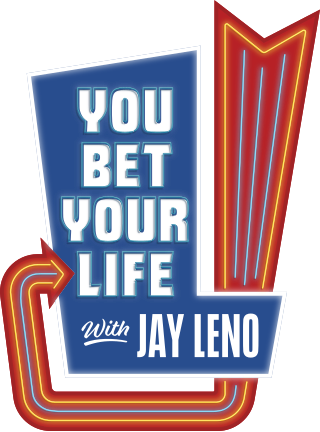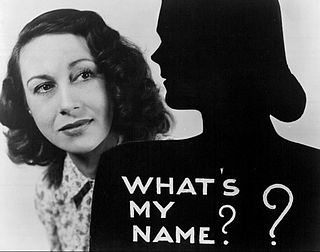Related Research Articles

A game show is a genre of broadcast viewing entertainment where contestants compete for rewards. The shows are typically directed by a host, who explains the rules of the game as well as commentating and narrating where necessary. The history of the game shows dates back to the late 1930s when both radio and television game shows were broadcast. The genre became popular in the United States in the 1950s, becoming a regular feature of daytime television.

The $64,000 Question was an American game show broadcast in primetime on CBS-TV from 1955 to 1958, which became embroiled in the 1950s quiz show scandals. Contestants answered general knowledge questions, earning money which doubled as the questions became more difficult. The final question had a top prize of $64,000, hence the "$64,000 Question" in the show's title.
Hollywood Screen Test is an American talent show that aired on ABC from 1948 to 1953. This program holds the distinction as the first regularly broadcast television series by the American Broadcasting Company.

You Bet Your Life is an American comedy quiz series that has aired on both radio and television. The original version was hosted by Groucho Marx of the Marx Brothers, with announcer and assistant George Fenneman. The show debuted on ABC Radio on October 27, 1947, moved to CBS Radio debuting October 5, 1949, and went to NBC-TV and NBC Radio on October 4, 1950. Because of its simple format, it was possible to broadcast the show on both radio and television but not simultaneously. Many of the laughs on the television show were evoked by Groucho's facial reactions and other visual gimmicks; the two versions were slightly different. The last episode in a radio format aired on June 10, 1960. The series continued on television for another year, recording a season on September 22, 1960 with a new title, The Groucho Show.

Dennis James was an American television personality, philanthropist, and commercial spokesman. Until 1976, he had appeared on TV more times and for a longer period than any other television star. Alternately referred to as "The Dean of Game Show Hosts" and the "Godfather of Gameshows", he was the host of television's first network game show, the DuMont Network's Cash and Carry (1946).

Benjamin Franklin Grauer was an American radio and television personality, following a career during the 1920s as a child actor in films and on Broadway. He began his career as a child in David Warfield's production of The Return of Peter Grimm. Among his early credits were roles in films directed by D.W. Griffith.

Pantomime Quiz, initially titled Pantomime Quiz Time and later Stump the Stars, was an American television game show produced and hosted by Mike Stokey. Running from 1947—1959, it has the distinction of being one of the few television series—along with The Arthur Murray Party; Down You Go; The Ernie Kovacs Show, The Original Amateur Hour; and Tom Corbett, Space Cadet—to air on all four TV networks in the US during the Golden Age of Television.
Camouflage is an American television game show originally produced in 1961–62 and revived in 1980.
Celebrity Time was an American game and audience participation television series that was broadcast on ABC in 1949 - 1950 and on CBS in 1950 - 1952. The original host was Douglas Edwards.

Strike It Rich is a game show that was broadcast on American radio from June 29, 1947 to December 27, 1957, on CBS and NBC. It was broadcast on television as well, starting in 1951. People in need of money appeared and told their tale of woe, then tried to win money by answering four questions. If the contestant did not win any money, the emcee opened the "Heart Line", which was a phone line to viewers who wished to donate to the contestant's family.
100 Grand is an American game show hosted by Jack Clark. The series ran for three episodes, weekly on Sunday nights from September 15 to 29, 1963.
Play the Game, also known as Let's Play the Game, was one of the earliest game shows to be broadcast over an American television network, and the first known example of a television panel show. In 1941-42, CBS aired an early game show, CBS Television Quiz.
Break the Bank is an American quiz show which aired variously – and sometimes co-existed in separate radio and television forms – on Mutual Radio, ABC Radio and NBC Radio Network, as well ABC, CBS and NBC television, from 1945 to 1957. From October 1956 to January 1957, NBC aired a short-lived prime-time television version called Break the $250,000 Bank.
Doorway to Fame is an American talent show broadcast on the now defunct DuMont Television Network. The series ran from May 2, 1947, to July 11, 1949.
Pick a Box was an Australian game shows that first aired on radio in 1948 until the early 1960s; subsequently, the concept transferred to TV and was broadcast from 1957 and 1971. The program was hosted by the husband and wife duo Bob and Dolly Dyer
You Are an Artist is a television series, which first aired on NBC flagship station WNBT-TV in New York City and "a small network of stations on the East Coast" on May 13, 1946, and then continued on the NBC Television network until 1950.
Charade Quiz was an American game show hosted by Bill Slater which aired on the DuMont Television Network Thursdays at 8:30 p.m. ET from November 27, 1947, to June 23, 1949.
The Chase is an American television quiz show adapted from the British program of the same name. It premiered on August 6, 2013, on the Game Show Network (GSN). It was hosted by Brooke Burns and featured Mark Labbett as the "chaser". A revival of the show premiered on January 7, 2021, on ABC. It is hosted by Sara Haines and initially featured as the chasers Jeopardy! champions James Holzhauer, Ken Jennings, and Brad Rutter. Labbett returned as a chaser in June 2021, before stepping down in 2022 along with Jennings. In their place are Buzzy Cohen, Brandon Blackwell, and Victoria Groce.

What's My Name? was a 30-minute radio program in the United States. The program was hosted by Arlene Francis and was among the first radio shows to offer cash prizes to contestants.
Bank on the Stars is an American game show that aired on CBS and NBC from 1953 to 1954. The series was hosted by Jack Paar, Bill Cullen, and Jimmy Nelson. Roger Price, Olin Tice and Bill McCord were the announcers.
References
- 1 2 3 4 Brooks, Tim; Marsh, Earle F. (June 24, 2009). The Complete Directory to Prime Time Network and Cable TV Shows, 1946-Present. Random House Publishing Group. p. 55. ISBN 978-0-307-48320-1 . Retrieved December 20, 2021.
- ↑ "Who's Got What on the Cable-The Revised Sked" (PDF). Billboard. January 15, 1949. p. 16. Retrieved December 20, 2021.
- ↑ "TV shows continue as GOP meet opens" (PDF). Broadcasting. June 21, 1948. p. 37. Retrieved December 20, 2021.
- 1 2 Gould, Jack (December 14, 1947). "Programs in Review: Video Quiz Has Debut -- Mr. Heidt's Show" . The New York Times. p. X 11. Retrieved December 20, 2021.
- ↑ "UCLA Archive: Americana". cinema.library.ucla.edu. Archived from the original on June 30, 2012.